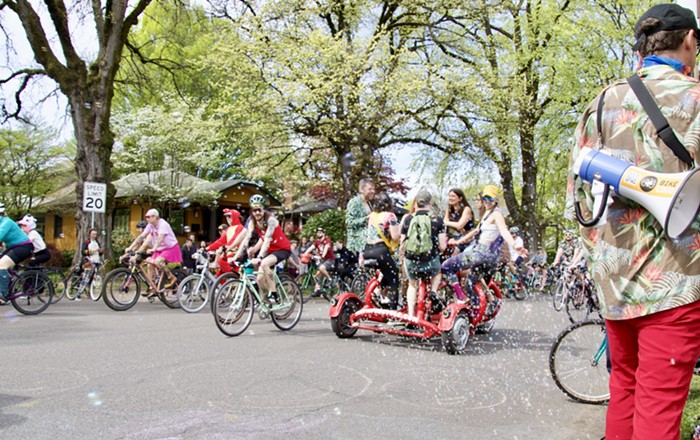There are bike lanes running east, west, and south through downtown Portland. But, right now, there is no northbound bike lane through downtown traffic. And it looks like there won't be—at least for a good while longer.
This spring, the Portland Bureau of Transportation (PBOT) started pitching the idea of a northbound bike lane on 12th Avenue. But now the idea is on hold after powerful businesses expressed concern about the bikeway's impact on traffic and parking.
At the heart of this issue is how businesses view bikes in the central city. A bike lane is one thing, but in 2013, the city is hoping to roll out dozens of bike sharing stations with hundreds of bikes in Portland's core. Building a safe network to support all those new bikes downtown is going to require the political and financial support of Portland's business community.
The city was eyeing 12th Avenue for a bike lane because it is a relatively low-traffic street with no streetcar or light rail tracks (which often snag cyclists' wheels). "Downtown Portland has the highest percentage of bike to work commuters in the country and there's no northbound route to get through the city," notes PBOT spokesman Dan Anderson.
In April, the Portland Business Alliance (PBA) and a group of businesses including McMenamin's and Gerding Edlen, wrote two separate letters criticizing the plan for a 12th Avenue bike lane. While 12th Avenue has relatively little traffic right now, say the businesses, none of the street's three car travel lanes or two parking lanes should be given over to bikes because future development could lead to more car traffic. On top of that, the businesses want the city to research the impact of and need for the bike lanes on SW Stark, SW Oak, and SW Broadway that have been "demonstration projects" for three years now. "We would like to see a follow-up process that includes an evaluation and sunset-review date," the PBA wrote in its April 26th letter.
"We're not out there pounding the pavement, talking about removal, we just want a better understanding of usage and impact," says PBA spokeswoman Megan Doern.
Bicycle Transportation Alliance Advocate Gerik Kransky says he's looking forward to talking in-depth with downtown business owners over the next year as part of a campaign called "Bikes Mean Business." As for the business reaction to the 12th Avenue project... "I respect their position, they have some valid points," says Kransky. "But I'm disappointed that there seems to be a reflexive opposition for considering new, safe facilities for people who ride bikes because of some outdated mentality that customers only show up in cars. There should be no disctinction in the business communities mentality between people who bike and people who drive." According to the 2010 bike count, 14 percent of traffic over downtown bridges is bikes.
The 12th Avenue bikeway now has "no timeline" for being built, says PBOT's Anderson. He notes that while the city is looking at altering the SW Stark and Oak lanes to make them safer, removing the lanes is not currently on the table.
"You look at New York City, you look at San Francisco, you look at Chicago—both city leaders and business leaders are encouraging the growth of biking, pedestrians, transit, because they see that it's good for business and a vibrant downtown," says Anderson. "We're definitely going to be continuing to serve the public by pushing for safe bikeways downtown."
So are bike lanes actually bad for business? The big-picture goals of healthier workers, cleaner air, and safer streets are definitely good for business long-term. And bike tourism brings in over $9 million a year for Portland.
But there are only a couple studies of the short-term business impact of bike lanes specifically and they've had conflicting results. For example, not a single merchant interviewed along the bike lanes in San Francisco's Mission District thought the lanes had decreased their sales and 37 percent say they saw an increase in sales thanks to the lanes. But in Vancouver, BC, businesses along new downtown bike lanes reported a decrease in sales ranging from five to 10 percent.
Here in Portland, BikePortland posted a study last year that shows a mixed business reaction to the buffered lanes on SW Stark and SW Oak. A plurality of business owners along the lanes said that the new lanes made parking and loading more difficult, but also that they support the bike lanes and think they're important.
Other types of bike infrastructure have been more clearly helpful to businesses. A Portland State grab study of bike corrals, 40 percent of businesses near bike corrals say they've seen an increase or strong increase in customers who are bicyclists and 84 percent say the racks enhance the identity of the neighborhood.
Portland has a long list of bike shops, bike business groups, and bike-friendly businesses, but the 12th Avenue situation makes it clear that bike projects are far from getting an automatic thumbs-up from the city's most powerful business alliance.













